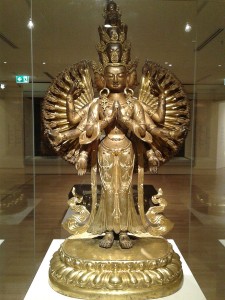
An awful lot of my friends have been complaining lately about how overwhelming and depressing it can be to read the news. I sympathize; right now the headlines seem like an endless litany of reports about situations that are already incomprehensibly bad, or examples where hope for positive change appears to be swirling inexorably down the drain.
But wait! Before you decide to check out – to deactivate your Facebook account, stop checking the news, or absorb yourself in activities that make you feel secure and happy – please keep in mind that your very witnessing is bodhisattva action. A bodhisattva is a someone who has vowed to save all beings. One of the most popular bodhisattva archetypes of all time is that of Avalokiteshvara, the bodhisattva of compassion. Also known as Kuan Yin, Kannon, or Kanzeon, his/her name means, “Perceiver of the cries of the world.” I hope you will take some strength and inspiration from a myth about Avalokiteshvara:
How the Bodhisattva of Compassion Ended up with Eleven Heads and a Thousand Arms
According to an ancient Tibetan text, the Mani Kambum, Avalokiteshvara made a vow to liberate all sentient beings from their sufferings. Because of the strength of his compassion, he was able to see all living beings – not just in our world, but in other worlds as well. He observed how extensive and intense their suffering was, and he was filled with great sadness. He saw how entrenched sentient beings were in the greed, hate, and delusion that caused such suffering. Tears flowed from his eyes, and he begged the Buddhas for guidance on how to fulfill his vow.
The Buddhas encouraged Avalokiteshvara not to give up, and so he made a further vow, that “from each and every pore of my body, may I manifest Buddhas and bodhisattvas according to the needs of all sentient beings. With these manifestations, may I liberate all sentient beings without leaving anyone behind. If I have self-clinging, may my head crack into pieces.”(1)
Some time later, Avalokiteshvara looked out again over the many worlds, figuring he must have made some progress in liberating sentient beings. He despaired to find the number of suffering sentient beings had not decreased at all. His confidence faltered, and he felt the task he had vowed to do was impossible. He briefly entertained the thought that he had better concentrate on liberating himself. With that thought, he broke his bodhisattva vow and his head cracked into a hundred pieces.
Fortunately, a Buddha reassembled the pieces of Avalokiteshvara’s skull and then transformed them into eleven heads. The heads faced in all directions and were stacked on top of one another. Ten of the faces looked peaceful, but one of the faces had a wrathful appearance in order to overcome obstacles that cannot be subdued peacefully. With these many heads, Avalokiteshvara had an even greater capacity for perceiving the cries of the world.
Then the Buddha explained that the world of suffering sentient beings (samsara) would last for an incomprehensibly long time, and that Avalokiteshvara would have to keep working until the end of samsara. Faced with this daunting task, the bodhisattva asked for – and received – a thousand arms and a thousand eyes (one in the palm of each hand) with which to benefit beings.
The Benefit of Witnessing
Avalokiteshvara does what he can to relieve suffering, but the emphasis is always on his/her activity of perceiving. He listens, watches, and bears witness.
We all know how helpful and healing it can be just to have someone listen to us, or to have someone acknowledge our suffering. Sometimes that’s all we need. Sometimes our listener can’t help us, but at least we know we’re not alone.
Of course, the fact that bearing witness to one another’s suffering can be powerfully beneficial is not an argument that action isn’t necessary. The bodhisattva of compassion also responds whenever and however she can, and so should we. However, when we don’t know what to do, or when we feel there is nothing we can do, it’s important to remember that simply witnessing is of benefit.
Turning away in order to preserve our own comfort is not bodhisattva activity. For one thing, there may indeed be something we can do (or something we can stop doing) to help, and if we turn away we won’t know it. For another thing, skimping on compassion in order to protect ourselves starves our hearts. At the very least, bearing witness and wishing well for others acknowledges the truth of our interdependence with all sentient beings and the great earth.
We may need to take a break from the news for a little bit to meditate or otherwise restore our own sanity. We may need to consider carefully what media to expose ourselves to, when to do it, and how much information to consume at a given time. But don’t turn away just because you feel like you’re going to burst trying to hold all the suffering – that’s only natural. Even Avalokiteshvara couldn’t hold it all. We can’t hold it all. Maybe we can use a Buddhist version of the oft-adapted British motto:
Let your head crack open
and carry on
We’ll be okay. Maybe we’ll always carry some sadness with us, but that’s not much a burden compared with those being shouldered by so many people all over the world.
(1) From a retelling of this part of the Mani Kambum by Venerable Shangpa Rinpoche.











